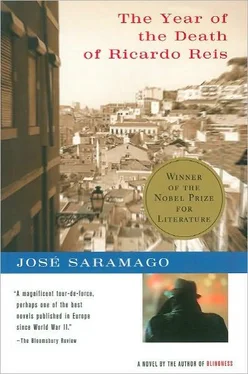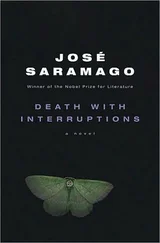José Saramago - Year of the Death of Ricardo Reis
Здесь есть возможность читать онлайн «José Saramago - Year of the Death of Ricardo Reis» весь текст электронной книги совершенно бесплатно (целиком полную версию без сокращений). В некоторых случаях можно слушать аудио, скачать через торрент в формате fb2 и присутствует краткое содержание. Год выпуска: 1992, ISBN: 1992, Издательство: Houghton Mifflin Harcourt, Жанр: Современная проза, на английском языке. Описание произведения, (предисловие) а так же отзывы посетителей доступны на портале библиотеки ЛибКат.
- Название:Year of the Death of Ricardo Reis
- Автор:
- Издательство:Houghton Mifflin Harcourt
- Жанр:
- Год:1992
- ISBN:9780547546926
- Рейтинг книги:4 / 5. Голосов: 1
-
Избранное:Добавить в избранное
- Отзывы:
-
Ваша оценка:
- 80
- 1
- 2
- 3
- 4
- 5
Year of the Death of Ricardo Reis: краткое содержание, описание и аннотация
Предлагаем к чтению аннотацию, описание, краткое содержание или предисловие (зависит от того, что написал сам автор книги «Year of the Death of Ricardo Reis»). Если вы не нашли необходимую информацию о книге — напишите в комментариях, мы постараемся отыскать её.
Year of the Death of Ricardo Reis — читать онлайн бесплатно полную книгу (весь текст) целиком
Ниже представлен текст книги, разбитый по страницам. Система сохранения места последней прочитанной страницы, позволяет с удобством читать онлайн бесплатно книгу «Year of the Death of Ricardo Reis», без необходимости каждый раз заново искать на чём Вы остановились. Поставьте закладку, и сможете в любой момент перейти на страницу, на которой закончили чтение.
Интервал:
Закладка:
Ricardo Reis decides to leave before noon, he does not wait for the farewell ceremony in honor of the Virgin, he has said his good-byes. The airplane passed over twice, meanwhile, and dropped more leaflets advertising Bovril. The bus back has few passengers, as expected, the great exodus will come later. At the bend in the road a wooden cross has been stuck into the ground. There was no miracle after all.
...
Trusting in God and Our Blessed Lady from the time of Afonso Henriques to the Great War. This is the phrase that has haunted Ricardo Reis since his return from Fatima. He cannot recall whether he read it in a newspaper or book, or whether he heard it in a sermon or speech, it may even have been in the advertisement for Bovril. The words fascinate him, the expression is eloquent and calculated to rouse passions and kindle hearts, for it proves that we are a chosen people. There have been other peoples in the past and there will be other peoples in the future, but there are none that have endured as long, eight hundred years of steadfast loyalty, of constant intimacy with the heavenly powers. It is true that we were slow in creating the fifth empire, that Mussolini forged ahead of us, but the sixth empire will not elude us, nor the seventh, all we need is patience, and patience is in our nature. We are already on the right road, according to a public statement made by His Excellency the President of the Republic, General Antonio Oscar de Fragoso Carmona, in a speech that should serve as a model for all the supreme magistrates of the nation to come. In his words, Portugal is now respected throughout the world, and we should be proud to be Portuguese, a sentiment no less noble than the one that precedes it, both of them eminently quotable. We can take pride in this worldwide respect, we who navigated the high seas, even if it is only in the capacity of most loyal ally, it does not matter of whom, what matters is loyalty, without it how could we live. Ricardo Reis, who returned from Fatima tired and sunburnt, without seeing either a miracle or Marcenda, and who for three days after that did not leave his apartment, reentered the outside world through the great door of this patriotic speech by the Honorable President. Taking his newspaper with him, he went to sit in the shadow of Adamastor. The old men were there, watching and perplexed by the arrival of the ships that had come to visit this promised land so avidly discussed by other nations, numerous ships bedecked with flags, sounding their festive sirens, their crews lined up on deck saluting. Light finally dawned in the heads of these two sentinels when Ricardo Reis gave them the newspaper he had by now digested and practically memorized, Yes, it was worth waiting eight centuries to feel proud of being Portuguese. From the Alto de Santa Catarina eight centuries salute you, O mighty sea. The old men, the thin one and the fat one, wipe away a furtive tear, sorry that they cannot remain for all eternity on this belvedere to watch the ships arriving, such bliss is harder to bear than the shortness of their lives. From the bench where he is seated Ricardo Reis witnesses love play between a soldier and a housemaid, the soldier takes liberties, the housemaid wards him off with provocative little slaps. This is a day for singing alleluias, which are the evoes of those who are not Greek, the flower beds are in full bloom, all a man needs to be happy unless he is eaten by insatiable ambitions. Ricardo Reis takes stock of his own ambitions and concludes that he craves nothing, that he is content to watch the river and the passing ships, the mountains and the peace that reigns there, yet he feels no happiness inside him, only this dull insect-gnawing that never stops. It's the weather, he murmurs, then asks himself how he would be feeling now if he had met Marcenda in Fatima, if, as people often say, they had fallen into each other's arms, We shall nevermore be parted, only when I thought I had lost you did I realize just how much I love you. She would use similar words, and then they would not know what else to say, even if they were free to run behind an olive tree and repeat for themselves the whispers, laughter, and sighs of others. Once more Ricardo Reis doubts, once more he feels the insect-gnawing in his bones. One cannot resist time, we are within it and accompany it, nothing more. Finished with the newspaper, the old men toss a coin to see who will take it home, even the one who cannot read covets this prize, as there is nothing better than newspaper for lining drawers.
When he arrived at his office that afternoon, the receptionist Carlota informed him, A letter has come for you, Doctor, I left it on your desk. Ricardo Reis felt as if a blow had been delivered to his heart or stomach. At such moments we lose all our self-possession, nor can we locate the blow, because the distance that separates the heart from the stomach is so small and there is also a diaphragm in the middle which is as much affected by the palpitations of the former as by the contractions of the latter. If God, who has learned so much over the years, were to create the human body today, He would make it much less complicated. The letter is from Marcenda, it must be, she has written to tell him that she could not travel to Fátima after all, or that she did go and saw him in the distance, even waved with her good arm, and felt despair, first because he did not see her and second because the Virgin did not heal her, Now, my love, I await you in the Quinta das Lágrimas, if you still love me. Obviously a letter from Marcenda, there it lies in the middle of the rectangular sheet of green blotting paper, the envelope pale violet. No, seen from the door it is white, an optical illusion, we are taught in school that blue and yellow make green, green and violet make white, and white and anxiety make us pale. The envelope is not violet, nor does it come from Coimbra. Ricardo Reis opened it carefully and found a small sheet of paper, on which was written, in the awful scrawl one expects from a doctor, Dear colleague, this is to let you know that I have made a good recovery and hope to resume my practice as of the beginning of next month, I wish to take this opportunity to express my deep gratitude for your willingness to stand in for me during my illness, I also wish you every success in soon finding a new appointment that will permit you to put your considerable skill and experience to good use. The letter continued for several more lines, the usual formalities observed by nearly everyone when he writes letters. Ricardo Reis, rereading these clichéd phrases, appreciated his colleague's finesse, which transformed the favor he had done for Ricardo Reis into the favor Ricardo Reis had done for him, thus allowing Ricardo Reis to leave with his head held high. And he would have a reference now to show when he went to look for work, not simply a letter of recommendation but written evidence of good and loyal service, just like the one the Hotel Brangança will give to Lydia if she ever decides to leave for another job or to marry. He put on his white coat and called in the first patient. In the waiting room there are five more patients to be examined, he will not have time now to cure them, happily their conditions are not so serious that they will die on his hands in the next twelve days, before the month expires, just as well.
No sign of Lydia. This is not her day off, true, but knowing that his trip to Fatima was simply a matter of going and coming straight back, and knowing that he could have met Marcenda there, she might at least have come to see if there was any news of her friend and confidante, to find out if Marcenda was well, if her arm had been cured. In half an hour Lydia could come to the Alto de Santa Catarina and go back, or she could call at his office, which is even closer and quicker. But she has not come, she has not asked. It was a mistake for him to have kissed her without taking her to bed, perhaps she thought that he was buying her with that kiss, if such thoughts occur to people of humble background. Alone in his apartment, Ricardo Reis leaves only to work and to dine, from his window he watches the river and the distant slopes of Montijo, the rock of Adamastor, the punctual old men, the palm trees. Occasionally he goes down to the park and reads a few pages of some book. He retires early, thinks about Fernando Pessoa, who is dead now, and about Alberto Caeiro, who disappeared in his prime and for whom there had been such high hopes, and about Alvaro de Campos, who went to Glasgow, at least that is what he said in his telegram, he will probably settle there, building ships to the end of his days or until he is pensioned off. Occasionally Ricardo Reis goes to the movies and sees Our Daily Bread directed by King Vidor, or The Thirty-Nine Steps with Robert Donat and Madeleine Carroll, and he could not resist going to the Sao Luis to see Audioscopes , a 3-D film. As a souvenir he brought home the celluloid spectacles one has to wear, green on one side, red on the other, these spectacles are a poetic instrument to see things for which normal vision is not enough.
Читать дальшеИнтервал:
Закладка:
Похожие книги на «Year of the Death of Ricardo Reis»
Представляем Вашему вниманию похожие книги на «Year of the Death of Ricardo Reis» списком для выбора. Мы отобрали схожую по названию и смыслу литературу в надежде предоставить читателям больше вариантов отыскать новые, интересные, ещё непрочитанные произведения.
Обсуждение, отзывы о книге «Year of the Death of Ricardo Reis» и просто собственные мнения читателей. Оставьте ваши комментарии, напишите, что Вы думаете о произведении, его смысле или главных героях. Укажите что конкретно понравилось, а что нет, и почему Вы так считаете.












